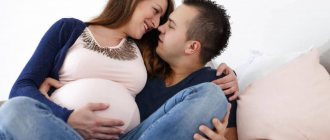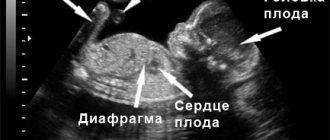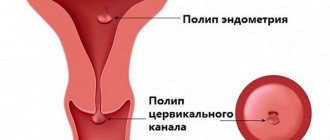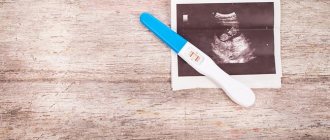Pain does not occur on its own. This is evidence of some processes occurring in the body. Thus, pain in the buttocks can be caused by changes in muscles and ligaments that occur naturally during pregnancy, or by diseases of the musculoskeletal system. It is quite difficult to independently determine the source of discomfort, and there is no single way to eliminate the problem. In order to find the right remedy for torment, you need to find out an accurate diagnosis, that is, unfortunately, you cannot do without a visit to the doctor. And the sooner you tackle the problem, the faster the result will be.
Possible causes of pain in the buttocks in a pregnant woman
Sensations in the thigh muscles can be of a different nature and manifest themselves in different ways. For example, if pain appears as a result of prolonged exercise, then most likely it will go away after proper rest. Discomfort on the inner side of the thigh indicates preparation for the birth of bones and ligaments. Pain radiating to the right or left buttocks in a pregnant woman occurs when the sciatic nerve is pinched. A lack of potassium, magnesium and calcium in a pregnant woman’s body provokes cramps, a sensation that cramps the muscles of the buttocks or legs.
And each of these cases requires special treatment. Even vitamin complexes should be prescribed by a doctor, since both a deficiency and an excess of some substances included in multivitamins are equally dangerous for the expectant mother.
Important! If the source of pain is unknown, physical activity or self-medication can harm the health of the pregnant woman.
The most common causes of pain in the buttocks:
- divergence of the pelvic bones;
- imbalance and poor posture;
- increase in the size of the uterus;
- excess weight;
- lack of vitamins and microelements;
- weak back, hip and abdominal muscles;
- diseases of the musculoskeletal system (sciatica, spinal hernia, osteochondrosis, radiculitis).
There is a whole list of diseases in which pregnant women may experience pain in the buttocks: problems with the rectum, arthritis, furunculosis, abscess, etc.
Depending on the causes of the pain, the doctor may prescribe special exercises, medication, wearing a prenatal bandage, massage or acupuncture (only from a good specialist!).
Important! Only pregnant women suffer from pain in the muscles of the back, legs and buttocks; this does not affect the child in any way.
Sciatica in expectant mothers
If a pregnant woman feels pain separately in the left or right buttock, then most likely this is a manifestation of sciatica. Sometimes the causes are an old injury or increased workload, but most often the disease is caused by the pressure of the growing fetus on the pelvic bones.
Symptoms of inflammation of the sciatic nerve:
- a burning sensation appears in the legs;
- the nature of the pain is sharp, “shooting”;
- numbness of the lower extremities;
- one-sided pain;
- pain occurs in the lower back and “sinks” into the leg;
- possible increase in body temperature.
Most movements with sciatica cause excruciating pain. Even changing body position can be difficult. Relief will come from a massage performed by a qualified specialist. Warm baths with salt will also relieve the pain a little, but it is dangerous for pregnant women to take them. You can try rubbing with alcoholic infusions of medicinal herbs or warming ointments, but only after consulting a doctor.
Important! If you have sciatica, any exercises for the legs, back and buttocks are prohibited for pregnant women.
Features of hip pain during pregnancy
The nature of the pain, as well as the circumstances in which discomfort occurs, suggest the cause of this condition.
Hip pain during sleep during pregnancy
Pain in the thighs that occurs during rest or sleep at night is a common complaint among pregnant women who are pregnant for long periods of time. Most often, this kind of discomfort is associated with stretching of the thigh muscles, pelvic muscles, and also the pubic symphysis. Preparation for labor is accompanied by a real “hormonal storm”, provoking increased mobility of the joints of the pelvis. Softening of the bone tissue often causes severe pain when sleeping on the side.
Why is a healthy pregnancy accompanied by pain?
During preparation for childbirth, the muscles and ligaments become softer, and the pelvic bones diverge slightly under the influence of hormones. Such changes are necessary so that the baby can pass through the birth canal. These processes are inevitable and are often accompanied by pain, which completely disappears after childbirth.
It is useful to know how a glucose tolerance test is performed.
Note: is it possible to do cupping massage during pregnancy?
But this is only one of the possible reasons. The growth of the uterus causes a very strong load on the hip joints, and there is a risk of pinching the sciatic nerve (sciatica). Posture changes due to a shift in the center of gravity of the body. In this case, the lower back is forced to bend, preventing normal blood circulation. All this is also accompanied by pain.
The lifestyle of a pregnant woman plays a significant role in the occurrence of pain:
- insufficient physical training;
- walking in high heels;
- long stay in a static position (sitting or standing work);
- severe weight gain;
- overwork, stress, poor night's sleep.
As a rule, discomfort appears after about the fifth month, when the uterus begins to significantly load the nerve endings and blood vessels in the spine area. But in the absence of physical activity or sedentary work, pain may appear much earlier. Most often, a dull, aching pain occurs, which intensifies when you begin to move (trying to stand up, walk).
Causes and provoking factors
It is important to know! Doctors are shocked: “An effective and affordable remedy for joint pain exists. " Read more.
Hip pain during pregnancy is common. Its severity may increase every month due to the increasing weight of the child. The growing uterus puts pressure on the pelvic organs, and changes in hormonal levels lead to the accumulation of excess fluid in the legs. The mammary glands swell, in the later stages of pregnancy, irregular contractions occur, and a mucous secretion is released from the vagina. Such physiological changes are natural, but it is still necessary to consult a doctor. Hip pain in the 3rd trimester of pregnancy often indicates that labor is approaching. The abdomen drops and the fetus moves towards the birth canal. During this period, the weight of the uterus may compress:
- nerve endings;
- blood vessels;
- structures of the ligamentous-tendon apparatus;
- muscles.
Soreness of the thighs is accompanied by rapid fatigue, tiredness, drowsiness, and dyspeptic disorders. At any stage of bearing a child, hormonal surges occur. In the first trimester, the body increases the production of progesterone, a female sex hormone that causes fluid retention. In late pregnancy, the concentration of estrogen in the systemic circulation increases, stimulating the removal of excess fluid from the body. Such hormonal fluctuations cause not only discomfort, but also the appearance of physiological pain in the hip joints.
Relaxation of ligaments
Soon after conception, the ovaries and placenta begin to produce relaxin. This hormone relaxes the ligaments of the pubic symphysis, stimulating the expansion of the pelvis for the normal passage of the child through the birth canal. It is under the influence of relaxin and steroids produced by the ovaries that a pregnant woman’s mammary glands enlarge. The hormone promotes the formation of additional vessels and expansion of the circulatory system, which is necessary to provide the fetus with nutrients and biologically active substances. At the same time, it relaxes all the ligaments located in the area of the hip joints to promote the growth of cervical tissue and increase its elasticity. As a result, not only the hips experience excessive stress, but also the knees and ankles.
Sciatic nerve entrapment
An increase in fetal weight and uterine volume leads to pinching of the spinal nerve roots of the lumbosacral spine. Under the influence of negative factors (for example, hypothermia), this condition can be complicated by the inflammatory process and innervation disorder. A characteristic symptom of sciatic nerve entrapment is severe pain in the lower back, radiating to the hip area. They can be sharp, piercing, and subside only when taking a certain body position. And during pregnancy this is not easy. To prevent the normal functioning of the hip joint from being disrupted, you should immediately consult a doctor. He will prescribe gentle treatment with drugs that do not have a teratogenic effect.
Deficiency of vitamins and microelements
If there is a shortage of these biologically active substances necessary for the full growth and development of the fetus, the body begins to “take” them from cartilage, bone tissue, and connective tissue structures. And this significantly worsens the condition of the joints, reduces the strength and elasticity of ligaments, tendons, and muscles. While carrying a baby, the expectant mother should receive at least 1.5 g of calcium per day. For the formation of the fetal skeleton and its full functioning, the same amount of phosphorus is needed. Disturbances in calcium-phosphorus metabolism can provoke osteomalacia and osteoporosis. But at the initial stage, the body signals about the deficiency by discomfort when walking.
Pain in the hips during pregnancy also occurs with a lack of potassium. Usually its reserves are depleted by frequent urination. The uterus puts pressure on the bladder, which causes the urge to empty it. A pregnant woman, in the absence of contraindications, should drink 2-2.5 liters of fluid daily. With potassium deficiency, the pain is localized in the legs, radiates to the thighs, and is accompanied by night cramps.
| Factors that provoke the appearance of pain in the hip joints during pregnancy | Characteristic features of uncomfortable sensations, ways to eliminate them |
| Sedentary lifestyle | During pregnancy, women prefer to move little, trying to avoid situations that could harm the baby. This leads to a decrease in muscle tone, weakening of the ligamentous-tendon apparatus, and subsequently to difficulties during childbirth. To eliminate pain in the hips that occurs with increased physical activity, daily physical therapy exercises are recommended. |
| Excessive exercise | High physical activity also provokes the appearance of pain in the hip joints. Due to hormonal fluctuations, swelling and weight gain, the body is unable to cope with physical activity. Gynecologists recommend that women get more rest, and instead of long walks or work in the country, do yoga and swimming |
How to relieve pain?
Partial pain in the back muscles, if it is not associated with a disease, can be reduced:
- giving up high-heeled shoes for a while;
- alternating long-term immobility (sedentary, standing work) with regular changes of position, a short warm-up or walk;
- wearing a bandage that will take on part of the load;
- control over weight gain.
The best time to address the problem of pain in the legs and back is at the stage of pregnancy planning. It is advisable to prepare the body for the load in advance (work the muscles of the back, legs, abs), and undergo a medical examination to rule out problems with the spine.
Useful to read: benefits of chicory during pregnancy.
It is interesting to know how to do a pregnancy test with iodine.
All about how to choose reusable diapers for your baby.
If osteochondrosis, rheumatism, pinched nerves and other diseases were observed before pregnancy, then during pregnancy they will definitely make themselves felt. Moreover, it will be much more difficult to relieve pain during pregnancy, since some exercises for the buttocks, back, abs and many medications are prohibited for expectant mothers.
Important! Water aerobics and yoga for expectant mothers under the supervision of a good trainer can simultaneously work out the muscles and relax them.
How to prevent pain in the buttocks?
It is not possible to completely get rid of muscle discomfort, even if it is not caused by a disease, but it can be alleviated a little. Some exercises that strengthen the buttocks will help prepare the body and work out the muscles of a pregnant woman:
- forward lunges with support;
- lunges to the side;
- imitation of walking on stairs (step onto a sports platform);
- half squats;
- abduction of the leg from a position lying on its side.
Lunges are done with a straight back and a retracted (as far as possible) stomach. The toes should be parallel to each other and pointing forward. A straight back will remove excess stress from the lower back. The support (a chair when performing lunges, a step for walking) must be strong and reliable. It is advisable to carry out the training under the supervision of a good specialist who works with pregnant women, since there are many nuances in performing exercises to strengthen the buttocks, back and legs that can either help or negate all efforts.
It is advisable to begin preparing muscles for stress even before conception or at the very beginning of pregnancy. If the pregnant woman already has pain in the buttocks, then exercises are allowed only after an accurate diagnosis has been made, since there are situations when a woman needs complete immobility. Treatment with compresses, ointments and massage should also be agreed with your doctor. Prevention of pain will include comfortable shoes, good nutrition, moderate physical activity, a comfortable night's rest and calm nerves. And if it is quite difficult for a pregnant woman to ensure that she is stress-free, then she can do everything else.
A set of exercises for pregnant women:
Prevention methods
Unpleasant sensations in the legs are easier to prevent than to cure. To avoid hip pain during pregnancy, you need to prepare for it in advance. Every woman is recommended to undergo preconception preparation and have her body examined for chronic and infectious diseases.
It is necessary to lead a healthy lifestyle. Provide moderate physical activity, nutritious nutrition, and normalize work and rest schedules.
You can avoid relapse of pain by strengthening the muscles of the back and lower back. To do this, you should regularly do yoga and stretching, exercise therapy, walk in the fresh air, and use a bandage.
What to do if the pain radiates to the genitals?
Unpleasant painful sensations when sitting can radiate to the perineum. Such a symptom should alert a woman, especially if the pain syndrome worsens every time the mother wants to sit down. According to the period of gestation, this symptom may mean various problems or may not pose a threat to the woman at all.
Reasons why it hurts to sit during pregnancy if the pain radiates to the genitals at different stages:
- After 20 weeks, mothers with incorrect placement of the fetus in the womb or during multiple pregnancies often complain about this problem. The baby may rest his legs against the bladder and other organs, and discomfort occurs precisely in the perineum while sitting.
- At 36-37 weeks, this sign indicates a separation of the pelvic ligaments and bones. This syndrome can be tolerated for the benefit of the unborn child, because it occurs intermittently.
- In the first trimester, the uterus may become toned, which affects the perineal area and causes pain. This symptom is considered dangerous and it is better to seek help from a doctor.
- Immediately before giving birth, women may also experience discomfort when sitting. This is due to compression of certain nerves - the condition is characterized by stabbing pains, but with the birth of the baby everything goes away.
You should not delay treatment and solution to this problem: it is better to visit a doctor if the pain has become sharp, constant and prolonged.










